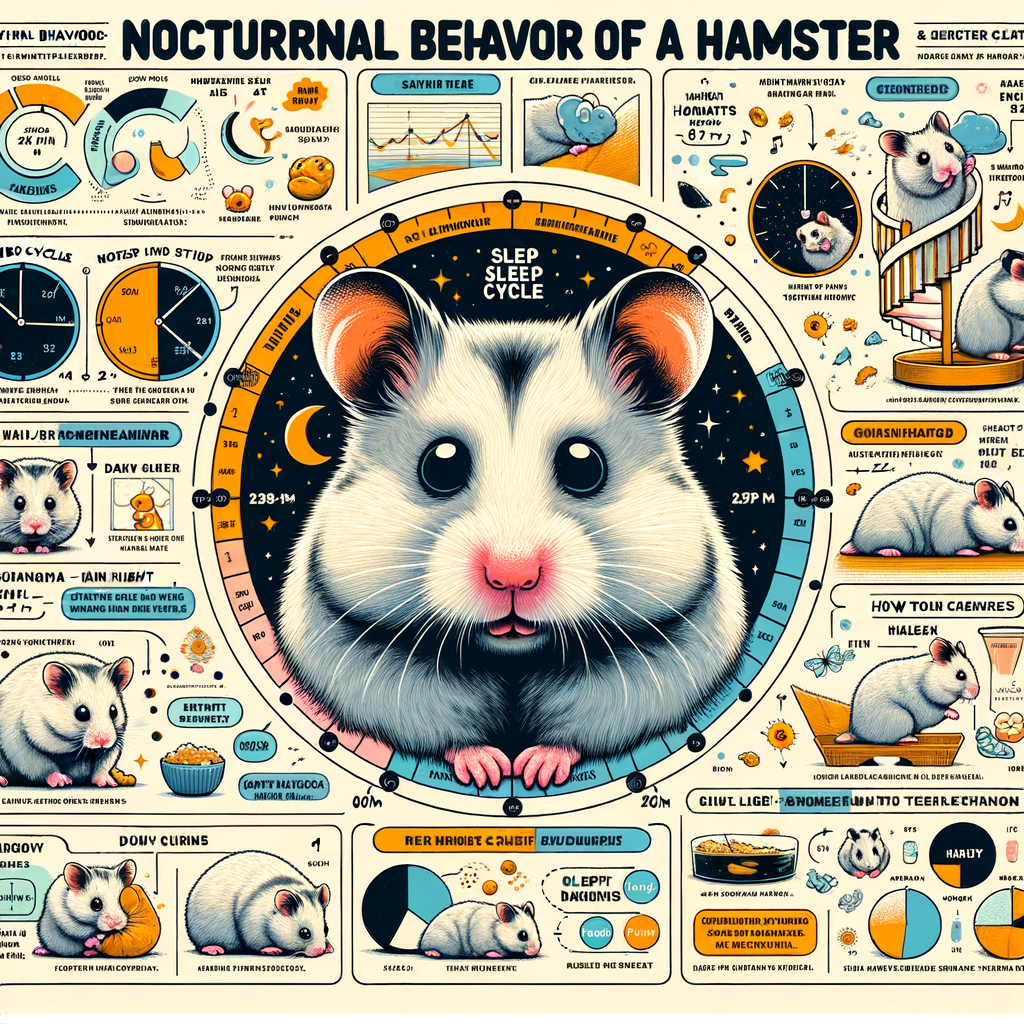
Introduction to Hamster Sleep Patterns
Have you ever wondered why your hamster seems to be active at the oddest hours? Or why it seems to sleep all day? The answer lies in their unique sleep patterns. Let’s dive into the fascinating world of hamster sleep and discover what makes these tiny creatures tick.
- Understanding the Importance of Studying Hamster Sleep Patterns
- Overview of Hamster Sleep Secrets
Studying hamster sleep patterns is not just about satisfying our curiosity. It’s about ensuring the health and happiness of our furry friends. Hamsters are nocturnal creatures, meaning they are most active during the night and sleep during the day. Understanding this can help us provide a better environment for them, reducing stress and promoting their well-being.
Hamsters have a sleep cycle that is opposite to ours, which is why they seem to be active when we are ready to sleep. They usually sleep for about 6 to 8 hours during the day, wake up for a few hours in the evening, and then go back to sleep. They then wake up again in the late night to early morning hours. This cycle is influenced by their natural instincts to avoid predators during the day.
As we delve deeper into the topic, we will uncover more about hamster sleep behavior, the factors that affect it, and how we can use this knowledge to improve their lives. So, stay tuned as we unravel the mystery of hamster sleep patterns.
Understanding Hamster Sleep
One of the most fascinating aspects of hamsters is their unique sleep patterns. Understanding these patterns can help us provide a more comfortable and healthy environment for our furry friends.
Hamster Sleep Cycle
Just like humans, hamsters also have a sleep cycle. However, it is quite different from ours. Let’s delve into it.
- Explanation of the Hamster Sleep Cycle
- Key differences between Hamster Sleep Cycle and Human Sleep Cycle
Hamsters are primarily nocturnal creatures. This means they are most active during the night and sleep during the day. A typical hamster sleep cycle lasts for about 14 hours, with the majority of that time being during daylight hours. They usually wake up in the evening and stay active throughout the night.
While humans typically sleep at night and stay awake during the day, hamsters do the exact opposite. This is because in the wild, hamsters are prey animals. Staying active at night helps them avoid predators that are active during the day. Another key difference is the duration of sleep. Humans typically require 7-9 hours of sleep, while hamsters sleep for about 14 hours.
Understanding these differences is crucial for hamster owners. It allows us to respect their natural sleep patterns and provide them with a comfortable and stress-free environment.
Hamster Nocturnal Behavior
Hamsters are fascinating creatures with unique behaviors that set them apart from many other pets. One of these unique behaviors is their nocturnal nature. But what does this mean, and how does it affect their sleep patterns? Let’s explore.
- Exploring the nocturnal nature of hamsters
Hamsters are primarily nocturnal creatures. This means they are most active during the night and sleep during the day. This behavior is a survival instinct that has been passed down from their wild ancestors. In the wild, being active at night helps hamsters avoid predators that are active during the day.
As a pet owner, this means you might notice your hamster running on its wheel or exploring its cage when it’s dark outside. It’s important to understand this behavior and respect your hamster’s sleep schedule. Disturbing a sleeping hamster can cause stress and negatively impact its health.
- How nocturnal behavior affects Hamster Sleep Patterns
The nocturnal nature of hamsters greatly influences their sleep patterns. Since they are active at night, they sleep mostly during the day. A typical hamster can sleep around 6 to 8 hours during the day, waking up periodically for short periods of activity before going back to sleep.
Interestingly, hamsters have a sleep cycle that’s quite different from ours. While humans have a single long sleep period, hamsters have multiple short sleep periods throughout the day. This is another adaptation from their wild ancestors, allowing them to stay alert for potential threats.
In conclusion, understanding your hamster’s nocturnal behavior and sleep patterns can help you provide a better environment for your pet. It’s important to respect their sleep schedule and provide them with plenty of activities to do during their active hours.
Unveiling Hamster Sleep
Hamsters are fascinating creatures, especially when it comes to their sleep habits. Understanding these habits can help you provide the best care for your furry friend.
Hamster Sleep Habits
Let’s delve into the common sleep habits of hamsters and how you can observe and understand them better.
- Common Hamster Sleep Habits
- How to Observe and Understand Your Hamster’s Sleep Habits
Hamsters are primarily nocturnal animals, meaning they sleep during the day and are active at night. They usually sleep for about 6 to 8 hours during the day, wake up for a few hours in the evening, and then go back to sleep until the early hours of the morning. However, some hamsters may also exhibit crepuscular behavior, being most active during twilight hours (dawn and dusk).
It’s important to note that each hamster may have slightly different sleep habits. Factors such as age, species, and individual personality can affect a hamster’s sleep pattern.
Observing your hamster’s sleep habits can be a fun and informative activity. Start by noting when your hamster is most active and when it tends to sleep. You can do this by simply watching your hamster or by using a webcam to record its activities when you’re not around.
Understanding your hamster’s sleep habits is crucial for its health and happiness. For instance, waking a hamster during its sleep time can cause stress and health issues. Therefore, it’s best to interact with your hamster during its active hours.
By understanding and respecting your hamster’s sleep habits, you can ensure that your pet lives a healthy and happy life. Remember, every hamster is unique, so don’t be surprised if your hamster’s sleep habits differ slightly from the norm.
Sleep Schedule of Hamsters
Understanding the sleep schedule of hamsters is essential for their health and happiness. Let’s delve into the typical sleep schedule of a hamster and the factors that can affect it.
- Typical sleep schedule of a hamster
- Factors that can affect the Sleep Schedule of Hamsters
- Lighting: Hamsters use light cues to regulate their sleep-wake cycle. Sudden changes in light exposure can disrupt their sleep schedule.
- Temperature: Hamsters tend to sleep more when it’s cold and less when it’s warm. This is because they are adapted to conserve energy during colder months.
- Stress: Just like humans, hamsters can have their sleep affected by stress. A new environment, loud noises, or changes in their routine can cause stress and disrupt their sleep.
- Age: Older hamsters tend to sleep more than younger ones. This is a normal part of the aging process.
Hamsters are primarily nocturnal creatures. This means they sleep during the day and are active at night. A typical hamster usually sleeps for about 6 to 8 hours during the day, wakes up in the evening, and stays active throughout the night. However, some hamsters may also exhibit crepuscular behavior, meaning they are most active during twilight hours – dawn and dusk. It’s important to note that every hamster is unique and may not strictly adhere to this schedule.
Several factors can influence a hamster’s sleep schedule. These include:
Understanding these factors can help you provide a comfortable and healthy environment for your hamster, promoting a regular sleep schedule.
In conclusion, while hamsters have a typical sleep schedule, it’s important to remember that each hamster is unique. Paying attention to your hamster’s individual sleep patterns and considering the factors that can affect their sleep can help ensure their well-being.
Hamster Sleep Behavior
Hamsters are fascinating creatures with unique sleep behaviors that set them apart from many other pets. Understanding these behaviors can help you provide a better environment for your hamster and ensure its overall well-being.
Hamster Sleep Duration
One of the most intriguing aspects of hamster sleep behavior is the duration of their sleep. Let’s delve into this topic to understand it better.
- Understanding the Average Hamster Sleep Duration
- How to Ensure Your Hamster is Getting Enough Sleep
- Provide a Quiet Environment: Hamsters are sensitive to noise. Try to keep their cage in a quiet place during the day to avoid disturbing their sleep.
- Maintain a Consistent Schedule: Hamsters thrive on routine. Try to feed and play with your hamster at the same times each day to help regulate their sleep cycle.
- Provide a Comfortable Bedding: Soft, comfortable bedding can help your hamster sleep better. Avoid using materials that can irritate their skin or respiratory system.
Hamsters are nocturnal animals, which means they are most active during the night and sleep during the day. On average, a hamster sleeps for about 14 hours a day. However, this can vary depending on factors such as their age, health, and the specific breed of the hamster.
Younger hamsters tend to sleep more than older ones. Similarly, some breeds like the Syrian hamsters sleep more than others like the Dwarf hamsters. It’s essential to monitor your hamster’s sleep pattern to understand what’s normal for them.
Ensuring your hamster gets enough sleep is crucial for their health and happiness. Here are some tips to help your hamster get the rest it needs:
Understanding and respecting your hamster’s sleep behavior is key to ensuring their health and happiness. Remember, every hamster is unique, so it’s important to observe your pet and adjust their environment as needed to support their sleep needs.
Conclusion: Decoding the Mystery of Hamster Sleep Patterns
As we reach the end of our exploration into the fascinating world of hamster sleep patterns, it’s time to summarize our key findings and provide some practical advice for supporting your hamster’s sleep.
- Key takeaways about Hamster Sleep Patterns
- Practical tips for supporting your hamster’s sleep
- Keep your hamster’s environment quiet and dark during their sleep time to avoid disturbing them.
- Try to match your hamster’s active hours for play and interaction. This can help reduce stress and promote better sleep.
- Provide a cozy and warm sleeping area for your hamster. This can be a small box or a hamster bed filled with soft bedding material.
- Monitor your hamster’s sleep patterns for any sudden changes, which could indicate health issues.
Hamsters are primarily nocturnal creatures, which means they are most active during the night. They typically sleep during the day, with their sleep cycles lasting around 30 minutes to 2 hours. It’s also important to note that hamsters can adjust their sleep patterns based on their environment and the habits of their owners.
Hamsters also exhibit a unique behavior called ‘torpor’, a state of decreased physiological activity, which can be mistaken for deep sleep or hibernation. This usually happens when the temperature drops or food is scarce.
Understanding your hamster’s sleep patterns can help you provide a more comfortable and healthy environment for them. Here are some practical tips:
In conclusion, understanding and respecting your hamster’s sleep patterns can greatly contribute to their overall health and happiness. Remember, a well-rested hamster is a happy hamster!








